【全国市级联考word】山东省德州市2018届高三统考二模英语试题(有答案)
山东省德州市2018届高三上学期期末考试英语试题 Word版含答案

第Ⅰ卷(满分100分)第一部分听力(共两节,满分30分)做题时,先将答案标在试卷上。
录音内容结束后,你将有两分钟的时间将试卷上的答案转涂到答题卡上。
第一节(共5小题;每小题1.5分,满分7.5分)听下面5段对话。
每段对话后有一个小题,从题中所给的A、B、C三个选项中选出最佳选项,并标在试卷的相应位置。
听完每段对话后,你都有10秒钟的时间来回答有关小题和阅读下一小题。
每段对话仅读一遍。
1. Where will the woman go?A. The Town Center.B. The shopping mall.C. The tea shop.2. How does the man feel about the interview?A. Nervous.B. Excited.C. Confident.3. What will the speakers do next?A. Watch the movie.B. Go home.C. Go to dinner.4. What are the speakers doing?A. Playing a game.B. Drawing pictures.C. Telling a joke.5. When is the deadline of the report?A. Oct. 15.B. Oct. 20.C. Oct. 25.第二节(共15小题;每小题1.5分,满分22.5分)听下面5段对话或独白。
每段对话或独白后有几个小题,从题中所给的A、B、C三个选项中选出最佳选项,并标在试卷的相应位置。
听每段对话或独白前,你将有时间阅读各个小题,每小题5秒钟;听完后,各小题将给出5秒钟的作答时间。
每段对话或独白读两遍。
听第6段材料,回答第6和第7题。
6. What does the man want to do?A. Go to the bedroom and have a rest.B. Help the woman with dinner.C. Clean up the bedroom.7. Why doesn’t the woman want the man to lie down on the bed?A. The dinner will be ready soon.B. Lots of clothes are on the bed.C. His Christmas gift is in the bedroom.听第7段材料,回答第8、9题。
山东省德州市2018届高三统考二模英语试题含答案

第Ⅰ卷(满分100分)第一部分听力(共两节,满分30分)做题时,先将答案标在试卷上。
录音内容结束后,你将有两分钟的时间将试卷上的答案转涂到答题卡上。
第一节(共5小题;每小题1.5分,满分7.5分)听下面5段对话。
每段对话后有一个小题,从题中所给的A、B、C三个选项中选出最佳选项,并标在试卷的相应位置。
听完每段对话后,你都有10秒钟的时间来回答有关小题和阅读下一小题。
每段对话仅读一遍。
1. Why has the man moved to New York?A. To visit the woman.B. To work there.C. To travel.2. Which of the following channels does the man like best?A. Comedy.B. Fashion.C. Sports.3. What is the man doing now?A. Making the work plan.B. Buying something for office.C. Arranging his schedule.4. What’s the relationship between the two speakers?A. Boss and employee.B. Mum and son.C. Teacher and student.5. How was the weather last week?A. Windy.B. Sunny.C. Foggy.第二节(共15小题;每小题1.5分,满分22.5分)听下面5段对话或独白。
每段对话或独白后有几个小题,从题中所给的A、B、C三个选项中选出最佳选项,并标在试卷的相应位置。
听每段对话或独白前,你将有时间阅读各个小题,每小题5秒钟;听完后,各小题将给出5秒钟的作答时间。
每段对话或独白读两遍。
听第6段材料,回答第6、7题。
2018届山东省德州市高三上学期期末考试英语试题 Word版含答案
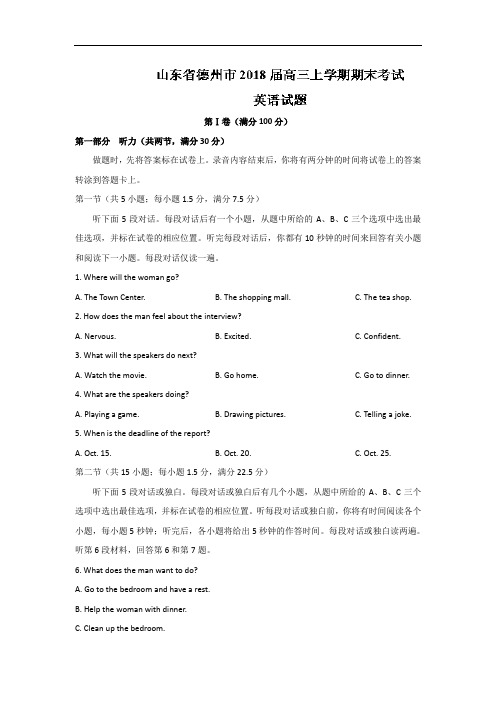
第Ⅰ卷(满分100分)第一部分听力(共两节,满分30分)做题时,先将答案标在试卷上。
录音内容结束后,你将有两分钟的时间将试卷上的答案转涂到答题卡上。
第一节(共5小题;每小题1.5分,满分7.5分)听下面5段对话。
每段对话后有一个小题,从题中所给的A、B、C三个选项中选出最佳选项,并标在试卷的相应位置。
听完每段对话后,你都有10秒钟的时间来回答有关小题和阅读下一小题。
每段对话仅读一遍。
1. Where will the woman go?A. The Town Center.B. The shopping mall.C. The tea shop.2. How does the man feel about the interview?A. Nervous.B. Excited.C. Confident.3. What will the speakers do next?A. Watch the movie.B. Go home.C. Go to dinner.4. What are the speakers doing?A. Playing a game.B. Drawing pictures.C. Telling a joke.5. When is the deadline of the report?A. Oct. 15.B. Oct. 20.C. Oct. 25.第二节(共15小题;每小题1.5分,满分22.5分)听下面5段对话或独白。
每段对话或独白后有几个小题,从题中所给的A、B、C三个选项中选出最佳选项,并标在试卷的相应位置。
听每段对话或独白前,你将有时间阅读各个小题,每小题5秒钟;听完后,各小题将给出5秒钟的作答时间。
每段对话或独白读两遍。
听第6段材料,回答第6和第7题。
6. What does the man want to do?A. Go to the bedroom and have a rest.B. Help the woman with dinner.C. Clean up the bedroom.7. Why doesn’t the woman want the man to lie down on the bed?A. The dinner will be ready soon.B. Lots of clothes are on the bed.C. His Christmas gift is in the bedroom.听第7段材料,回答第8、9题。
【优质】山东省德州市2018届高三上学期期末考试英语试题+Word版含答案
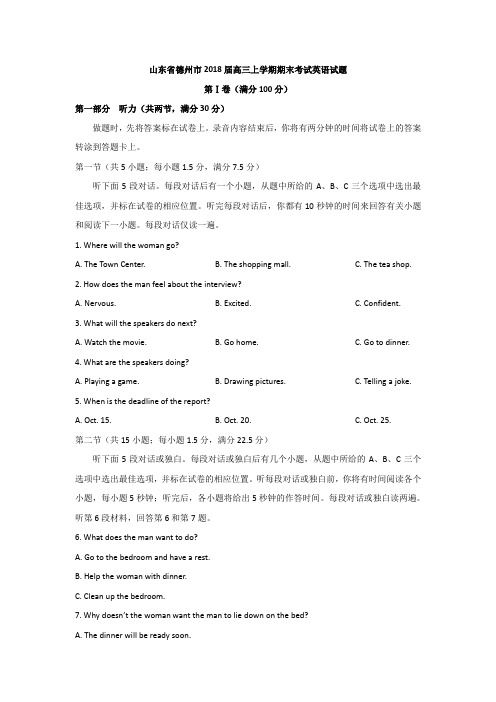
山东省德州市2018届高三上学期期末考试英语试题第Ⅰ卷(满分100分)第一部分听力(共两节,满分30分)做题时,先将答案标在试卷上。
录音内容结束后,你将有两分钟的时间将试卷上的答案转涂到答题卡上。
第一节(共5小题;每小题1.5分,满分7.5分)听下面5段对话。
每段对话后有一个小题,从题中所给的A、B、C三个选项中选出最佳选项,并标在试卷的相应位置。
听完每段对话后,你都有10秒钟的时间来回答有关小题和阅读下一小题。
每段对话仅读一遍。
1. Where will the woman go?A. The Town Center.B. The shopping mall.C. The tea shop.2. How does the man feel about the interview?A. Nervous.B. Excited.C. Confident.3. What will the speakers do next?A. Watch the movie.B. Go home.C. Go to dinner.4. What are the speakers doing?A. Playing a game.B. Drawing pictures.C. Telling a joke.5. When is the deadline of the report?A. Oct. 15.B. Oct. 20.C. Oct. 25.第二节(共15小题;每小题1.5分,满分22.5分)听下面5段对话或独白。
每段对话或独白后有几个小题,从题中所给的A、B、C三个选项中选出最佳选项,并标在试卷的相应位置。
听每段对话或独白前,你将有时间阅读各个小题,每小题5秒钟;听完后,各小题将给出5秒钟的作答时间。
每段对话或独白读两遍。
听第6段材料,回答第6和第7题。
6. What does the man want to do?A. Go to the bedroom and have a rest.B. Help the woman with dinner.C. Clean up the bedroom.7. Why doesn’t the woman want the man to lie down on the bed?A. The dinner will be ready soon.B. Lots of clothes are on the bed.C. His Christmas gift is in the bedroom.听第7段材料,回答第8、9题。
山东省德州市2018届高三上学期期末考试英语试题 Word版含答案

第Ⅰ卷(满分100分)第一部分听力(共两节,满分30分)做题时,先将答案标在试卷上。
录音内容结束后,你将有两分钟的时间将试卷上的答案转涂到答题卡上。
第一节(共5小题;每小题1.5分,满分7.5分)听下面5段对话。
每段对话后有一个小题,从题中所给的A、B、C三个选项中选出最佳选项,并标在试卷的相应位置。
听完每段对话后,你都有10秒钟的时间来回答有关小题和阅读下一小题。
每段对话仅读一遍。
1. Where will the woman go?A. The Town Center.B. The shopping mall.C. The tea shop.2. How does the man feel about the interview?A. Nervous.B. Excited.C. Confident.3. What will the speakers do next?A. Watch the movie.B. Go home.C. Go to dinner.4. What are the speakers doing?A. Playing a game.B. Drawing pictures.C. Telling a joke.5. When is the deadline of the report?A. Oct. 15.B. Oct. 20.C. Oct. 25.第二节(共15小题;每小题1.5分,满分22.5分)听下面5段对话或独白。
每段对话或独白后有几个小题,从题中所给的A、B、C三个选项中选出最佳选项,并标在试卷的相应位置。
听每段对话或独白前,你将有时间阅读各个小题,每小题5秒钟;听完后,各小题将给出5秒钟的作答时间。
每段对话或独白读两遍。
听第6段材料,回答第6和第7题。
6. What does the man want to do?A. Go to the bedroom and have a rest.B. Help the woman with dinner.C. Clean up the bedroom.7. Why doesn’t the woman want the man to lie down on the bed?A. The dinner will be ready soon.B. Lots of clothes are on the bed.C. His Christmas gift is in the bedroom.听第7段材料,回答第8、9题。
山东省德州市2018届高三上学期期末考试英语试题Word版含答案(高中 高三 英语试题)
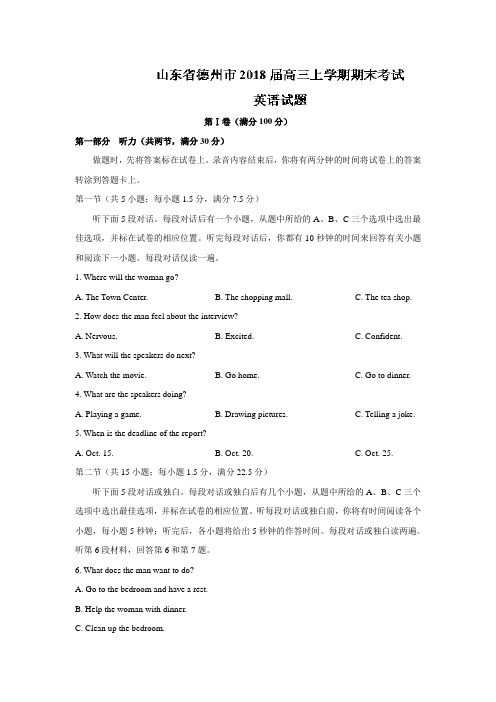
第Ⅰ卷(满分100分)第一部分听力(共两节,满分30分)做题时,先将答案标在试卷上。
录音内容结束后,你将有两分钟的时间将试卷上的答案转涂到答题卡上。
第一节(共5小题;每小题1.5分,满分7.5分)听下面5段对话。
每段对话后有一个小题,从题中所给的A、B、C三个选项中选出最佳选项,并标在试卷的相应位置。
听完每段对话后,你都有10秒钟的时间来回答有关小题和阅读下一小题。
每段对话仅读一遍。
1. Where will the woman go?A. The Town Center.B. The shopping mall.C. The tea shop.2. How does the man feel about the interview?A. Nervous.B. Excited.C. Confident.3. What will the speakers do next?A. Watch the movie.B. Go home.C. Go to dinner.4. What are the speakers doing?A. Playing a game.B. Drawing pictures.C. Telling a joke.5. When is the deadline of the report?A. Oct. 15.B. Oct. 20.C. Oct. 25.第二节(共15小题;每小题1.5分,满分22.5分)听下面5段对话或独白。
每段对话或独白后有几个小题,从题中所给的A、B、C三个选项中选出最佳选项,并标在试卷的相应位置。
听每段对话或独白前,你将有时间阅读各个小题,每小题5秒钟;听完后,各小题将给出5秒钟的作答时间。
每段对话或独白读两遍。
听第6段材料,回答第6和第7题。
6. What does the man want to do?A. Go to the bedroom and have a rest.B. Help the woman with dinner.C. Clean up the bedroom.7. Why doesn’t the woman want the man to lie down on the bed?A. The dinner will be ready soon.B. Lots of clothes are on the bed.C. His Christmas gift is in the bedroom.听第7段材料,回答第8、9题。
【全国市级联考】山东省德州市2018届高三上学期期末考试英语试题(原卷版)

山东省德州市2018届高三上学期期末考试英语试题第Ⅰ卷(满分100分)第一部分听力(共两节,满分30分)做题时,先将答案标在试卷上。
录音内容结束后,你将有两分钟的时间将试卷上的答案转涂到答题卡上。
第一节(共5小题;每小题1.5分,满分7.5分)听下面5段对话。
每段对话后有一个小题,从题中所给的A、B、C三个选项中选出最佳选项,并标在试卷的相应位置。
听完每段对话后,你都有10秒钟的时间来回答有关小题和阅读下一小题。
每段对话仅读一遍。
1. Where will the woman go?A. The Town Center.B. The shopping mall.C. The tea shop.2. How does the man feel about the interview?A. Nervous.B. Excited.C. Confident.3. What will the speakers do next?A. Watch the movie.B. Go home.C. Go to dinner.4. What are the speakers doing?A. Playing a game.B. Drawing pictures.C. Telling a joke.5. When is the deadline of the report?A. Oct. 15.B. Oct. 20.C. Oct. 25.第二节(共15小题;每小题1.5分,满分22.5分)听下面5段对话或独白。
每段对话或独白后有几个小题,从题中所给的A、B、C三个选项中选出最佳选项,并标在试卷的相应位置。
听每段对话或独白前,你将有时间阅读各个小题,每小题5秒钟;听完后,各小题将给出5秒钟的作答时间。
每段对话或独白读两遍。
听第6段材料,回答第6和第7题。
6. What does the man want to do?A. Go to the bedroom and have a rest.B. Help the woman with dinner.C. Clean up the bedroom.7. Why doesn’t the woman want the man to lie down on the bed?A. The dinner will be ready soon.B. Lots of clothes are on the bed.C. His Christmas gift is in the bedroom.听第7段材料,回答第8、9题。
山东省德州市2018届高三上学期期末考试英语试题+Word版含答案
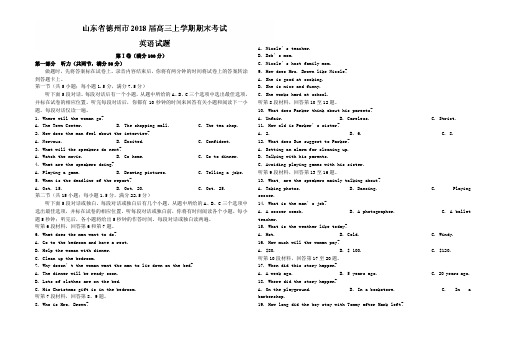
第Ⅰ卷(满分100分)第一部分听力(共两节,满分30分)做题时,先将答案标在试卷上。
录音内容结束后,你将有两分钟的时间将试卷上的答案转涂到答题卡上。
第一节(共5小题;每小题1.5分,满分7.5分)听下面5段对话。
每段对话后有一个小题,从题中所给的A、B、C三个选项中选出最佳选项,并标在试卷的相应位置。
听完每段对话后,你都有10秒钟的时间来回答有关小题和阅读下一小题。
每段对话仅读一遍。
1. Where will the woman go?A. The Town Center.B. The shopping mall.C. The tea shop.2. How does the man feel about the interview?A. Nervous.B. Excited.C. Confident.3. What will the speakers do next?A. Watch the movie.B. Go home.C. Go to dinner.4. What are the speakers doing?A. Playing a game.B. Drawing pictures.C. Telling a joke.5. When is the deadline of the report?A. Oct. 15.B. Oct. 20.C. Oct. 25.第二节(共15小题;每小题1.5分,满分22.5分)听下面5段对话或独白。
每段对话或独白后有几个小题,从题中所给的A、B、C三个选项中选出最佳选项,并标在试卷的相应位置。
听每段对话或独白前,你将有时间阅读各个小题,每小题5秒钟;听完后,各小题将给出5秒钟的作答时间。
每段对话或独白读两遍。
听第6段材料,回答第6和第7题。
6. What does the man want to do?A. Go to the bedroom and have a rest.B. Help the woman with dinner.C. Clean up the bedroom.7. Why doesn’t the woman want the man to lie down on the bed?A. The dinner will be ready soon.B. Lots of clothes are on the bed.C. His Christmas gift is in the bedroom.听第7段材料,回答第8、9题。
【100所名校】2018年山东高三二模英语试题(解析版)
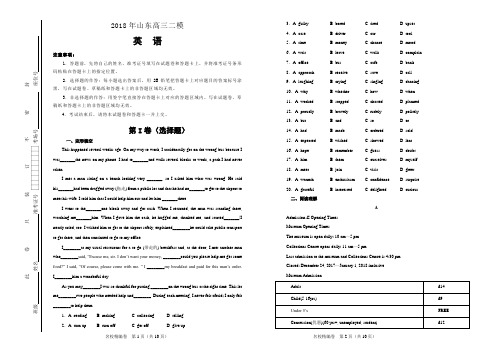
1.A.readingB.makingC.collectingD.telling
2.A.turn upB.turn offC.get offD.give up
3.A.guiltyB.boredC.tiredD.upset
4.A.caseBBiblioteka driverC.carD.tool
5.A.timeB.moneyC.chanceD.mood
I met a man sitting on a bench looking very_______, so I asked him what was wrong. He said his_______had been dragged away (拖走) from a public lot and that he had no_______to get to the airport to meet his wife. I told him that I could help him out and let him_______there.
11.A.workedB.stoppedC.chattedD.planned
12.A.proudlyB.bravelyC.rudelyD.politely
13.A.butB.andC.soD.or
14.A.hadB.madeC.orderedD.sold
15.A.expectedB.wishedC.showedD.lent
As you may________I was so thankful for putting________on the wrong bus at the right time. This let me________two people who needed help and________. During each meeting, I never felt afraid; I only felt________to help them.
2018届山东省德州市高三上学期期末考试英语试题Word版含解析版
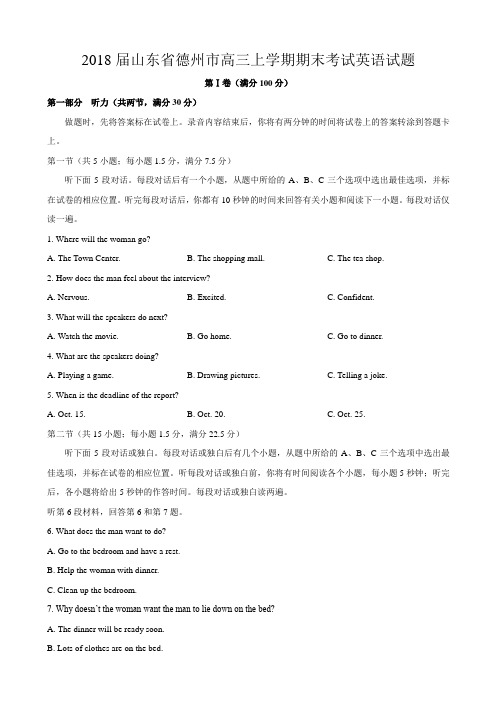
2018届山东省德州市高三上学期期末考试英语试题第Ⅰ卷(满分100分)第一部分听力(共两节,满分30分)做题时,先将答案标在试卷上。
录音内容结束后,你将有两分钟的时间将试卷上的答案转涂到答题卡上。
第一节(共5小题;每小题1.5分,满分7.5分)听下面5段对话。
每段对话后有一个小题,从题中所给的A、B、C三个选项中选出最佳选项,并标在试卷的相应位置。
听完每段对话后,你都有10秒钟的时间来回答有关小题和阅读下一小题。
每段对话仅读一遍。
1. Where will the woman go?A. The Town Center.B. The shopping mall.C. The tea shop.2. How does the man feel about the interview?A. Nervous.B. Excited.C. Confident.3. What will the speakers do next?A. Watch the movie.B. Go home.C. Go to dinner.4. What are the speakers doing?A. Playing a game.B. Drawing pictures.C. Telling a joke.5. When is the deadline of the report?A. Oct. 15.B. Oct. 20.C. Oct. 25.第二节(共15小题;每小题1.5分,满分22.5分)听下面5段对话或独白。
每段对话或独白后有几个小题,从题中所给的A、B、C三个选项中选出最佳选项,并标在试卷的相应位置。
听每段对话或独白前,你将有时间阅读各个小题,每小题5秒钟;听完后,各小题将给出5秒钟的作答时间。
每段对话或独白读两遍。
听第6段材料,回答第6和第7题。
6. What does the man want to do?A. Go to the bedroom and have a rest.B. Help the woman with dinner.C. Clean up the bedroom.7. Why doesn’t the woman want the man to lie down on the bed?A. The dinner will be ready soon.B. Lots of clothes are on the bed.C. His Christmas gift is in the bedroom.听第7段材料,回答第8、9题。
2018届山东省德州市高三模拟考试(二模)英语试题及答案

高中三年级模拟检测英语试题本试卷分为第I卷(选择题)和第Ⅱ卷(非选择题)两部分。
满分为150分,考试用时120分钟。
考试结束后。
将答题卡交回。
注意事项:一、答题前。
考生务必用0.5毫米黑色签字笔将自己的姓名、学校、班级和准考证号填写在答题卡规定的位置。
二、第I卷每小题选出答案后,用2B铅笔在答题卡上将对应题目的答案标号涂黑,如需要改动,用橡皮擦干净后,再选涂其他答案标号。
三、第Ⅱ卷必须用0.5毫米黑色签字笔作答,答案必须写在答题卡各题目指定区域内相应的位置,写在试卷上无效;如需改动,先划掉原来的答案,然后再写上新的答案;不能使用涂改液、胶带纸、修正带等修正工具。
不按以上要求作答的答案无效。
第I卷(两部分,共105分)第一部分英语知识运用(共两节。
满分55分)第一节单项填空(共10小题;每小题l.5分,满分l5分)从A、B、C、D四个选项中,选出可以填入空白处的最佳选项,并在答题卡上将该项涂黑。
1.‚What a miracle!‛said the baker,looking at finishedcake with satisfaction.A.a;the B.the;/ C./;a D.the;a2.一Are you satisfied with his grades?一Yes.In fact,he couldn’t have a result.A.good B.better C.worse D.bad3. too early for his appointment,Winston decided to read the magazines to kill the time.A.Arrive B.Arriving C.To arrive D.Having arrived 4.—Hey,where are you?—At the railway station.My train at 8:30 in the morning.A.1eaves B.is leaving C.will have left D.will leave 5.Was it on that lonely island he family finally settled down?A.when B.where C.that D.which6.It’s hard for elderly people to see convenience a smart phone can bring to us.A.which B.whose C.what D.how7.They could have attended the awarding ceremony,but their flight due to the bad weather.A.was delaying B.had been delayedC.has delayed D.was delayed8.The scenic spot can attract 10,000 tourists every year,up to half are foreigners.A.of which B.of whom C.in which D.for whom9.No matter appealing an advertisement is,remember that there is no such thing as a free lunch.A.what B.how C.when D.which 10.—We have booked two tickets for Romeo and Juliet.—,sir.A.I’m sure B.My pleasure C.It’s all right D.I’ll check第二节完形填空(共30小题;11至20题,每小题1分;21—40题,每小题1.5分。
2018届山东省德州市高三上学期期末考试英语试题 Word版 含答案

2018届山东省德州市高三上学期期末考试英语试题第Ⅰ卷(满分100分)第一部分听力(共两节,满分30分)做题时,先将答案标在试卷上。
录音内容结束后,你将有两分钟的时间将试卷上的答案转涂到答题卡上。
第一节(共5小题;每小题1.5分,满分7.5分)听下面5段对话。
每段对话后有一个小题,从题中所给的A、B、C三个选项中选出最佳选项,并标在试卷的相应位置。
听完每段对话后,你都有10秒钟的时间来回答有关小题和阅读下一小题。
每段对话仅读一遍。
1. Where will the woman go?A. The Town Center.B. The shopping mall.C. The tea shop.2. How does the man feel about the interview?A. Nervous.B. Excited.C. Confident.3. What will the speakers do next?A. Watch the movie.B. Go home.C. Go to dinner.4. What are the speakers doing?A. Playing a game.B. Drawing pictures.C. Telling a joke.5. When is the deadline of the report?A. Oct. 15.B. Oct. 20.C. Oct. 25.第二节(共15小题;每小题1.5分,满分22.5分)听下面5段对话或独白。
每段对话或独白后有几个小题,从题中所给的A、B、C三个选项中选出最佳选项,并标在试卷的相应位置。
听每段对话或独白前,你将有时间阅读各个小题,每小题5秒钟;听完后,各小题将给出5秒钟的作答时间。
每段对话或独白读两遍。
听第6段材料,回答第6和第7题。
6. What does the man want to do?A. Go to the bedroom and have a rest.B. Help the woman with dinner.C. Clean up the bedroom.7. Why doesn’t the woman want the man to lie down on the bed?A. The dinner will be ready soon.B. Lots of clothes are on the bed.C. His Christmas gift is in the bedroom.听第7段材料,回答第8、9题。
山东省德州市2018届高三统考二模英语试题Word版含答案

第Ⅰ卷(满分100分)第一部分听力(共两节,满分30分)做题时,先将答案标在试卷上。
录音内容结束后,你将有两分钟的时间将试卷上的答案转涂到答题卡上。
第一节(共5小题;每小题1.5分,满分7.5分)听下面5段对话。
每段对话后有一个小题,从题中所给的A、B、C三个选项中选出最佳选项,并标在试卷的相应位置。
听完每段对话后,你都有10秒钟的时间来回答有关小题和阅读下一小题。
每段对话仅读一遍。
1. Why has the man moved to New York?A. To visit the woman.B. To work there.C. To travel.2. Which of the following channels does the man like best?A. Comedy.B. Fashion.C. Sports.3. What is the man doing now?A. Making the work plan.B. Buying something for office.C. Arranging his schedule.4. What’s the relationship between the two speakers?A. Boss and employee.B. Mum and son.C. Teacher and student.5. How was the weather last week?A. Windy.B. Sunny.C. Foggy.第二节(共15小题;每小题1.5分,满分22.5分)听下面5段对话或独白。
每段对话或独白后有几个小题,从题中所给的A、B、C三个选项中选出最佳选项,并标在试卷的相应位置。
听每段对话或独白前,你将有时间阅读各个小题,每小题5秒钟;听完后,各小题将给出5秒钟的作答时间。
每段对话或独白读两遍。
听第6段材料,回答第6、7题。
2018-2019年德州市高三上学期期末考试英语试题及答案

A. AT G s h i r t . B. As k i r t . 回答第 8㊁ ㊀㊀ 听第 7 段材料 , a n s . j
选出每小题答案后 , 用2 用 ㊀㊀2. B 铅笔把答题卡上对应题目的答案标号涂 黑 . 如 需 改 动 , 橡皮擦干净后 , 再选涂其他答案标号框 . 全部答案在答题卡上完成 , 答在试卷上无效 . ㊀㊀3. 第一部分 ㊀ 听力 ( 共两节 , 满分 3 0 分) 先将答案标在试卷上 . 录音内容结束后 , 你将有两分钟的时间将试卷上的答案 ㊀㊀ 做题时 , 转涂到答题卡上 . 第一节 ㊀ ( 共 5 小题 ; 每小题 1. 满分 7. 5分, 5 分) 从题中所给的 A㊁ ㊀㊀ 听下面 5 段对话 . 每段对话后有一个小题 , B㊁ C 三个选项中选出最佳 选项 , 并标在试卷的相应位置 . 听完每段对话 后 , 你都有1 秒 钟 的 时 间来回答有关小题和 0 阅读下一小题 . 每段对话仅读一遍 . A. H e l oc a l l a t a x i . pt
高 三 英 语 试 题
选择题 ) 和第 Ⅱ 卷 ( 非选择题 ) 两部分 . ㊀㊀ 本试卷分第 Ⅰ 卷 ( 注意事项 : 答第I卷前考生务必将自己的姓名 ㊁ 准考证号填写在答题卡上 . ㊀㊀1.
2 0 1 9. 1
? 7. Wh a tw i l l t h ew o m a nt r n yo
? 8. Wh a td o e s t h ew o m a nw a n t t h ez o ot od o B. S e t a l l t h ea n i m a l s f r e e . A. G i v e t h e i ra n i m a l sn a m e s . C. D om o r eg o o dt h i n s f o ra n i m a l s . g
德州二模英语试题及答案
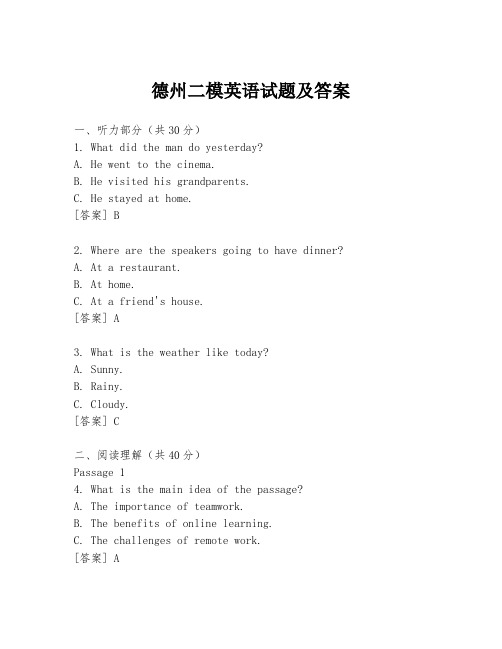
德州二模英语试题及答案一、听力部分(共30分)1. What did the man do yesterday?A. He went to the cinema.B. He visited his grandparents.C. He stayed at home.[答案] B2. Where are the speakers going to have dinner?A. At a restaurant.B. At home.C. At a friend's house.[答案] A3. What is the weather like today?A. Sunny.B. Rainy.C. Cloudy.[答案] C二、阅读理解(共40分)Passage 14. What is the main idea of the passage?A. The importance of teamwork.B. The benefits of online learning.C. The challenges of remote work.[答案] A5. According to the passage, which of the following is NOT a benefit of working in a team?A. Sharing ideas.B. Reducing workload.C. Increasing stress.[答案] CPassage 26. What is the author's opinion about the new policy?A. It is too restrictive.B. It is necessary.C. It is confusing.[答案] B7. What is the purpose of the policy?A. To protect the environment.B. To encourage public transportation.C. To reduce traffic congestion.[答案] C三、完形填空(共20分)8. The word "abandoned" in the first paragraph most probably means ______.A. left behindB. given upC. forgotten[答案] B9. What is the main reason for the protagonist's decision to leave?A. Financial difficulties.B. Lack of support.C. Fear of failure.[答案] A10. In the last paragraph, the author suggests that ______.A. success is inevitable.B. failure is a stepping stone.C. perseverance is essential.[答案] C四、语法填空(共10分)11. If it ______ (not rain) tomorrow, we will go for a picnic. [答案] didn't rain12. She ______ (be) a teacher for ten years before she becamea writer.[答案] had been13. The book is worth ______ (read).[答案] reading五、书面表达(共20分)14. Write an essay of about 120 words on the topic "The Importance of Honesty". You should write clearly and coherently, including an example or two to illustrate your point.[答案]略(考生需自行撰写作文)。
山东省德州市2018届高三统考二模英语试题

【全国市级联考】山东省德州市2018届高三统考二模英语试题学校:___________姓名:___________班级:___________考号:___________ 一、阅读选择1.What is the passage designed for?A.Introducing some writing skills to children.B.Attracting more students to attend the course.C.Persuading students to write more creatively.D.Arousing the children’s enthusiasm in literature.2.What problem can Lesson 2 help people to solve?A.Writing longhand. B.Finishing assignments.C.Being afraid of writing. D.Being too shy to join groups.3.The student recommendations make the course more .A.convincing B.challengingC.recognizable D.practicalSt Moritz, the showiest of Switzerland’s Alpine resorts (旅游胜地), is no ordinary ski town. It’s responsible for winter tourism as we know it today. It was a small band of English holidaymakers that changed Switzerland forever. In 1864 a bet took place between hotelier Johannes Badrutt and the vacationers on a damp September evening in St Moritz. As they sat around the fire at the Engadiner Kulm Hotel, concerned about returning to the foggy London winter, the Swiss manager saw a golden opportunity.“You holiday here in summer,” he challenged them over a bottle of red wine. “Why not enjoy the mountains year-round? Winter is so pleasant that on fine days you can even walk without a jacket.” Attracted by the promise of clean skies against a backdrop of towerin g peaks, the Englishmen were pleased to accept it; up until then, St Moritz had been a modest hiking destination in July and August. But if Badrutt’s promise proved false, the hotelier would pay for their journey and winter-long stay. How could they lose?Come mid-December, the group of men returned to Switzerland. Towards the end of their week-long journey, sitting on a horse-pulled sledge and wrapped head-to-toe in furs, they went through the 2,284m Julier Pass in southeastern Switzerland. But by the time of their arrival inSt Moritz, the skies had cleared, they were sweating abundantly, and Badrutt, jacketless and with his shirt sleeves rolled up, was there to greet them.Of course, Badrutt won the bet. Word quickly spread throughout Britain about St Mor itz’s distinctive climate—dry and sunny with a high degree of snow certainty. Year-round tourism landed the Alpine town of St Moritz.That Badrutt almost single-handedly marketed this undeveloped winter wonderland is a little unbelievable. The first tourist office in Switzerland had been established in the same year as the bet. Other resorts like the ones in Davos and Grindelwald were also popping up then. The story of St Moritz is, in some ways, also a tale of social transformation. But what Badrutt did made the Swiss mountains accessible in a way that no one else had done before, so his role as pioneer cannot be downplayed.4.What can we infer about Johannes Badrutt?A.He had a good sense of business.B.He was a man with some disabilities.C.He disliked living in mountains.D.He was addicted to gambling.5.How did the British vacationers react to the bet?A.They refused it because they thought it was unfair.B.They’d rather pay for their winter journey by themselves.C.They thought that a jacket-free walk was possible.D.They were sure that Badrutt would lose the bet.6.What finally made Badrutt the winner of the bet?A.His warmest welcome.B.The hotelier’s courage and wealth.C.The vacationers’ passion for travelling.D.The unique climate of St Moritz.7.What does the author think of the success of St Moritz?A.Davos and Grindelwald helped a lot.B.He owes it completely to the bet.C.Badrutt played an important role.D.The success was made by tourist office.20 years ago, a couple of ecologists, Daniel Janzen and Winnie Hallwachs, convinced Del Oro, a large orange juice producer, to donate part of their forestland to a national park in exchange for the right to dump (倾倒) massive amounts of orange peels on a 3-hectare piece of land within the national park, at no cost. Dealing with tons of waste peels usually involved burning them or paying to have them dumped at a landfill, so the proposal was very attractive.A year after the contract was signed, Del Oro dumped around 12,000 tons of sticky orange waste in the land. However, another juice company and rival of Del Oro challenged the deal in court, arguing that their competitor was “polluting the national park”. They ended up winning, and the deal between Del Oro and the national park fell through. The 3-hectare piece of land virtually covered with fruit waste was completely forgotten.Then, in 2013, Timothy Treuer, a scientist at Princeton University visited that piece of land 15 years earlier. What he found shocked him. “It was completely overgrown with t rees and vines,” Timothy Treuer recently said, “the difference between fertilized and unfertilized areas was visually surprised us a lot! We needed to come up with some really good standards to evaluate exactly what was happening there.”To confirm that the fruit waste was responsible for the revival of plant life, Treuer and his team spent months picking up samples, analyzing and comparing them. They found “dramatic differences between the areas covered in orange peels and those that were not. The area fertilized by orange waste had richer soil, greater tree-species richness and greater forest coverage. In a sense, it’s not just a win-win between the company and the local park—it’s a win for everyone.”The effect the orange peels had on the land is probably not that surprising to people familiar with composting (堆肥), but what is shocking is that a judge actually called this particular example polluting the national park and stopped it from going forward. Now that Timothy Treuer’s study has received worldwide attention, this type of polluting is being seriously considered as a way of bringing tropical forests back to life.8.Why was the deal proposed by the ecologists attractive to Del Oro?A.It would make farmers produce more oranges.B.It would help deal with the orange peel waste for free.C.It would increase the production of orange juice.D.It would save much space for the orange juice producer.9.What does the underlined phrase ‘‘fell through” in the second paragraph?A.became unbelievable B.failed to happenC.made something possible D.changed the course of an event 10.What did Treuer find when he visited the land covered with orange waste?A.The peel waste was hard to break down there.B.Del Oro continued dumping peel waste there.C.The peel waste enriched the soil of the land.D.The whole national park was polluted.11.What’s the best title of the passage?A.Orange peel waste found its way to reshape the national park.B.A couple of ecologists devoted themselves to restoring the forest.C.A casual attempt led to a series of expected magic results.D.Orange peel waste brought a forest back to life.Every day, we are inching closer to some kind of artificial intelligence. Advances in big data, machine learning and robotics are going to give us a world where computers are effectively intelligent in terms of how we deal with them. Should you be scared by this? Absolutely, but not in the usual “robot overlords” (机器人帝国) kind of way. Instead, the real fear should be about getting human beings wrong, not getting AI right.The key to the technology is the ability of computers to recognize human emotions based on the ‘‘activation” of muscles in the face. A computer can identify the positions of facial muscles and use them to infer the emotional state of its user. Then the machine responds in ways that take that emotional state into account.One potential application of it is to provide “emotional robots” for the elderly. Having a machine that could speak in a kind way would comfort a lonely older person. That is a good thing, right? But that won’t also relieve us from questioning how we ended up in a society that takes care of the elderly because we don’t know what else to do with them? Can’t we have more humane solutions than robots?“Emotion data” aren’t t he same thing as the real and vivid emotional experiences we human beings have. Our emotions are more than our faces or voices. How can they be pulled out like a thread, one by one, from the fabric of our being?Research programs can come with much philoso phical concern, too. From the computers’point of view, what the computing technology captures are emotions, but at its root is a reduction of human experience whose outward expressions can be captured algorithmically (计算上). As the technology is used in the world, it can reframe the world in ways that can be hard to escape from.The technology will clearly have useful applications, but once it treats emotions as data, we may find that it is the only aspect of emotion we come to recognize or value. Once billions of dollars floods into this field, we will find ourselves trapped in a technology that is reducing our lives. Even worse, our “emotion data” will be used against us to make money for someone else. And that is what scares me about AI.12.Why does the author feel scared of the development of artificial intelligence?A.The technology is developing much too slowly.B.Computers can’t recognize human emotions.C.Robots would get control of human beings.D.People may use artificial intelligence improperly.13.Why does the author dislike the idea of providing “emotional robots” for the elderly? A.The aged people will find it hard to live with them.B.What elderly people need is much more than that.C.It can’t relieve us of the pressure from modern society.D.It’s impossible to use them to keep the elderly healthy.14.What does the author intend to conclude in Paragraphs 4 and 5?A.Emotional data can’t be equal to human emotions.B.AI technology itself has fewer and fewer faults.C.AI-built-in robots won’t have t he ability to understand human beings.D.The information computers get can reframe human emotions.15.How does the author think about ‘‘emotion data” according to the last paragraph?A.It can arouse people’s sense of value.B.It can improve people’s human experience.C.It may be misused as a tool to make profits.D.It may push the AI technology forward.二、七选五When the kids are out of school, parents are eager to use the holidays for somequality family time. 16.While there’s great concern among paren ts about the impact of screens on physical activity and face-to-face communications, parental use of screens is often overlooked. One recent report found that parents spend over nine hours per day with screen media. It s no wonder that families find it hard to have high-quality social interactions.Want our kids to put down the phones and tablets?17.It’s necessary that we unplug when we ask our kids to do the same. Some family activities we create can help us engage with our kids without the concern of screen time.Why not leave the devices at home and go for a tech-free nature walk? It will be an opportunity to make us more connected to the world beyond the screen. Focus on being in the moment and kids may enjoy collecting plant seeds or stones.18.A board game night is ideal for bringing family members together and being engaged. Moreover, playing games together fosters social interaction, cooperation, and the development of Social Emotional Learning (SEL).19.Some other family activities are wonderfully fun without the use of electronic devices. For example, take the kids swimming, or bring them to an indoor rock climbing gym. Bake a cake for a neighbor or plant a garden.20.Your kids will get lost in the activity, forgetting the devices. To be clear, technology has many benefits to parents and children. However, creating some tech-free time can help parents and kids feel more connected to each other.A.We parents must model that behavior.B.Even so, too much of a good thing can be bad for family time.C.However, many of us find it hard to compete with electronics.D.Parents may learn from their kids about science and nature as well.E.Best of all, family members can enjoy being engaged in a shared experience.F.The kids are more likely to have buy-in when they feel like they have a say.G.All these activities require family members to focus their attention on the task at hand.三、完形填空A few days ago, I observed a teenager doing yardwork that his dad had told him to do. Instead of doing the task 21 , he wandered around there for hours, 22 to himself and doing a bad job.The person he hurt the most was himself. His dad was trying to teach him 23 and how to do a good job. As a result of his 24 attitude, he spent the whole afternoonfinishing a task that should have taken one or two hours. And the yard 25 wasn't clean enough when he got through.He 26 his day because of his attitude. And his dad was 27 with him, and the boy's bad mood ended up 28 the whole family that day.A sweet lady was working in a fast-food 29 . The minute I walked in, she welcomed me 30 . She smiled as she took my order, and then as we 31 for the food, she talked with me. As I walked off with my tray, she said with a big 32 , “I hope you have a blessed day!” I think the food tasted better because of her33 . There was a delay, during which I sat there hearing her singing as she 34 her tasks behind the counter.She wasn't making a large salary, and she didn't have a powerful 35 , either. In addition, she stood on her feet for a long shift each day, often dealing with 36 customers. But she chose to be joyful.I want to 37 from her. I want to do my best, even when there's no 38 or glory. Other people are watching me 39 I might not realize it at the time. I want to bring joy to all those around me. A(n) 40 can make a great difference.21.A.gradually B.happily C.secretly D.silently 22.A.responding B.applying C.explaining D.complaining 23.A.goodness B.safety C.responsibility D.gardening 24.A.poor B.positive C.strange D.efficient 25.A.almost B.even C.still D.ever 26.A.lost B.ruined C.perfected D.changed 27.A.upset B.pleased C.Impressed D.satisfied 28.A.breaking B.benefiting C.affecting D.controlling 29.A.factory B.restaurant C.supermarket D.shop 30.A.warmly B.proudly C.seriously D.coldly 31.A.looked B.asked C.waited D.struggled 32.A.shout B.smile C.cheer D.decision 33.A.experience B.trust C.Courage D.kindness 34.A.performed B.started C.discovered D.planned 35.A.appearance B.motivation C.position D.effort 36.A.ordinary B.Painful C.important D.difficult 37.A.escape B.learn C.hear D.differ38.A.applause B.regret C.sadness D.forgiveness 39.A.now that B.in case C.even though D.as if 40.A.lifestyle B.attitude C.habit D.attempt四、用单词的适当形式完成短文Jane Foster was out shopping when some wedding photos in the window of an antique shop 41.(catch) her eyes. It took her quite a while 42.she realized that she was looking at her mom’s long-lost old wedding photos.But how did they go 43.(miss), to begin with? Along with many other 44.(belonging), the photos had been auctioned (拍卖) off in 2003 after her family missed a payment for the storage facility where they were kept. You can only imagine how upset Jane must 45.(be) at the time. She was searching for them for 14 years before she 46.(accident) found them.She was flooded with 47.(relieve), but the owner of the store had another surprise for her. The photos weren’t the only items he had purchased from that auction. He remembered that he had also bought a wedding dress from 1948, and 48.turned out that this was Jane’s mother’s dress!Unfortunately, the woman passed away in 2013 and was therefore 49.(able) to be reunited with her prized possessions. But her daughter is thrilled with the treasured finding, considering it 50.a sign that her mom is still around and watching over her!五、短文改错51.假定英语课上老师要求同桌之间交换修改作文,请你修改你同桌写的以下作文。
- 1、下载文档前请自行甄别文档内容的完整性,平台不提供额外的编辑、内容补充、找答案等附加服务。
- 2、"仅部分预览"的文档,不可在线预览部分如存在完整性等问题,可反馈申请退款(可完整预览的文档不适用该条件!)。
- 3、如文档侵犯您的权益,请联系客服反馈,我们会尽快为您处理(人工客服工作时间:9:00-18:30)。
第Ⅰ卷(满分100分)第一部分听力(共两节,满分30分)做题时,先将答案标在试卷上。
录音内容结束后,你将有两分钟的时间将试卷上的答案转涂到答题卡上。
第一节(共5小题;每小题1.5分,满分7.5分)听下面5段对话。
每段对话后有一个小题,从题中所给的A、B、C三个选项中选出最佳选项,并标在试卷的相应位置。
听完每段对话后,你都有10秒钟的时间来回答有关小题和阅读下一小题。
每段对话仅读一遍。
1. Why has the man moved to New York?A. To visit the woman.B. To work there.C. To travel.2. Which of the following channels does the man like best?A. Comedy.B. Fashion.C. Sports.3. What is the man doing now?A. Making the work plan.B. Buying something for office.C. Arranging his schedule.4. What‟s the relationship between the two speakers?A. Boss and employee.B. Mum and son.C. Teacher and student.5. How was the weather last week?A. Windy.B. Sunny.C. Foggy.第二节(共15小题;每小题1.5分,满分22.5分)听下面5段对话或独白。
每段对话或独白后有几个小题,从题中所给的A、B、C三个选项中选出最佳选项,并标在试卷的相应位置。
听每段对话或独白前,你将有时间阅读各个小题,每小题5秒钟;听完后,各小题将给出5秒钟的作答时间。
每段对话或独白读两遍。
听第6段材料,回答第6、7题。
6. What are the two speakers talking about?A. Speedy players.B. Film stars.C. Famous writers.7. When did Dennis Hopper begin his career?A. Nine years old.B. Thirteen years old.C. Nineteen years old. 听第7段材料,回答第8、9题。
8. Which of the following has the woman tried to deal with sleeplessness?A. Taking sleeping pills.B. Drinking hot milk before bed.C. Eating chocolate.9. What suggestion does the man give to help the woman?A. Trying to relax before going to bed.B. Taking some other medicine.C. Having more sugar.听第8段材料,回答第10至12题。
10. Why did Mom and Dad have a quarrel this afternoon?A. Because the boy didn‟t get an “A”.B. Because the girl spent too much.C. Because they couldn‟t afford a party.11. Whose birthday parties will the girl attend?A. Her brother‟s.B. Her Mom and Dad‟s.C. Her best friends‟.12. How will the woman make some money soon?A. By looking after the neighbor‟s children.B. By walking dogs for their new neighbor.C. By helping parents do more housework.听第9段材料,回答第13至16题。
13. How did the woman get to the place?A. By bus.B. By taxi.C. On foot.14. Where does the conversation most probably take place?A. In an office.B. In a restaurant.C. At the airport.15. What does the woman like best?A. Fish.B. Beef.C. Pork.16. What does the woman like to drink?A. Tea.B. Coffee.C. Orange juice.听第10段材料,回答第17至20题。
17. Why do people use the way of freezing?A. To keep food clean.B. To make food delicious.C. To keep food fresh.18. What temperature should the freezing process go at?A. It should be between -10 and -15°C.B. It should be between -15 and -20°C.C. It should be between -20 and -25°C.19. How should vegetables be cooked before freezing?A. Removing extra water.B. Adding enough salt.C. Using special containers.20. How many times can foods be frozen in terms of health?A. Once.B. Twice.C. Three times.第二部分阅读理解(共两节,满分40分)第一节(共15小题;每小题2分,满分30分)阅读下列短文,从每题所给的四个选项(A、B、C和D)中,选出最佳选项,并在答题卡上将该选项涂黑。
AFree Online Creative Writing WorkshopSuitable for the students of all Levels Dream of writing poetry, short stories, or novels? Ever watched a movie or a play and felt the desire to write a script of your own? If so, take our course online. Not only will we bring you techniques all forms of creative writing need most, we will also touch on the challenges and techniques that make your writing unique while getting your brain—and your hand—moving.Lesson 1: Small StepsAs a student of this course, and as a creative writer, you will be writing. Decide where your words will go. Will you write longhand or will you type your words on a keyboard?Lesson 1 Video★ Complete Assignment: An Introduction★ Complete: Assignment 1: Starting Small★ Complete Exam: Lesson 1: Small StepsLesson 2: Getting Out of Your Own WayIf you long to write creatively, but you have a hard time getting started, you are not alone. There are far more people in the world who wish they were writers than those who actually write.Lesson 2 Video★ Review 2 Articles: Being Held Back by Your Fear of Writing?Online Writing Groups and Writing Communities★ Complete: Assignment 2: Combatting Fear★ Complete Exam: Lesson 2: Getting Out of Your Own WayStudent recommendations“Great job. I especially enjoyed the opportunity to learn about and try some writing experiences I‟d never thought I might like.” -Dot S.“The writing assignments and the instructor feedback were most helpful. I have taken two classes from this instructor, and I learned a great dea l in both.” -Karen R.“The course had many suggested activities and exercises. The more of these I did the better experience I had with each lesson.” -Mel T.21. What is the passage designed for?A. Introducing some writing skills to children.B. Attracting more students to attend the course.C. Persuading students to write more creatively.D. Arousing the children‟s enthusiasm in literature.22. What problem can Lesson 2 help people to solve?A. Writing longhand.B. Finishing assignments.C. Being afraid of writing.D. Being too shy to join groups.23. The student recommendations make the course more .A. convincingB. challengingC. recognizableD. practicalBSt Moritz, the showiest of Switzerland‟s Alpine resorts (旅游胜地), is no ordinary ski town. It‟s responsible for winter tourism as we know it today. It was a small band of English holidaymakers that changed Switzerland forever. In 1864 a bet took place between hotelier Johannes Badrutt and the vacationers on a damp September evening in StMoritz. As they sat around the fire at the Engadiner Kulm Hotel, concerned about returning to the foggy London winter, the Swiss manager saw a golden opportunity.“You holiday here in summer,” he challenged them over a bottle of red wine. “Why not enjoy the mountains year-round? Winter is so pleasant that on fine days you can even walk without a jacket.” Attracted by the promise of clean skies against a backdrop of towering peaks, the Englishmen were pleased to accept it; up until then, St Moritz had been a modest hiking destination in July and August. But if Badrutt‟s promise proved false, the hotelier would pay for their journey and winter-long stay. How could they lose?Come mid-December, the group of men returned to Switzerland. Towards the end of their week-long journey, sitting on a horse-pulled sledge and wrapped head-to-toe in furs, they went through the 2,284m Julier Pass in southeastern Switzerland. But by the time of their arrival in St Moritz, the skies had cleared, they were sweating abundantly, and Badrutt, jacketless and with his shirt sleeves rolled up, was there to greet them.Of course, Badrutt won the bet. Word quickly spread throughout Britain about St Moritz‟s distinctive climate—dry and sunny with a high degree of snow certainty. Year-round tourism landed the Alpine town of St Moritz.That Badrutt almost single-handedly marketed this undeveloped winter wonderland is a little unbelievable. The first tourist office in Switzerland had been established in the same year as the bet. Other resorts like the ones in Davos and Grindelwald were also popping up then. The story of St Moritz is, in some ways, also a tale of social transformation. But what Badrutt did made the Swiss mountains accessible in a way that no one else had done before, so his role as pioneer cannot be downplayed.24. What can we infer about Johannes Badrutt?A. He had a good sense of business.B. He was a man with some disabilities.C. He disliked living in mountains.D. He was addicted to gambling.25. How did the British vacationers react to the bet?A. They refused it because they thought it was unfair.B. They‟d rather pay for their winter journey by themselves.C. They thought that a jacket-free walk was possible.D. They were sure that Badrutt would lose the bet.26. What finally made Badrutt the winner of the bet?A. His warmest welcome.B. The hotelier‟s courage and wealth.C. The vacationers‟ passion for travelling.D. The unique climate of St Moritz.27. What does the author think of the success of St Moritz?A. Davos and Grindelwald helped a lot.B. He owes it completely to the bet.C. Badrutt played an important role.D. The success was made by tourist office.C20 years ago, a couple of ecologists, Daniel Janzen and Winnie Hallwachs, convinced Del Oro, a large orange juice producer, to donate part of their forestland to a national park in exchange for the right to dump (倾倒) massive amounts of orange peels on a 3-hectare piece of land within the national park, at no cost. Dealing with tons of waste peels usually involved burning them or paying to have them dumped at a landfill, so the proposal was very attractive.A year after the contract was signed, Del Oro dumped around 12,000 tons of sticky orange waste in the land. However, another juice company and rival of Del Oro challenged the deal in court, arguing that their competitor was “polluting the national park”. They ended up winning, and the deal between Del Oro and the national park fell through. The 3-hectare piece of land virtually covered with fruit waste was completely forgotten.Then, in 2013, Timothy Treuer, a scientist at Princeton University visited that piece of land 15 years earlier. What he found shocked him. “It was completely overgrown with trees and vines,” Timothy Treuer recently said, “the difference between fertilized and unfertilized areas was visually surprised us a lot! We needed to come up with some really good standards to evaluate exactly what was happening there.”To confirm that the fruit waste was responsible for the revival of plant life, Treuer and his team spent months picking up samples, analyzing and comparing them. They found “dramatic differences between the areas covered in orange peels and those that were not. The area fertilized by orange waste had richer soil, greater tree-species richness and greater forest coverage. In a sense, it‟s not ju st a win-win between the company and the local park—it‟s a win for everyone.”The effect the orange peels had on the land is probably not that surprising to people familiar with composting (堆肥), but what is shocking is that a judge actually called this particular example polluting the national park and stopped it from going forward. Now that Timothy Treuer‟s study has received worldwide attention, this type of polluting is being seriously considered as a way of bringing tropical forests back to life.28. Why was the deal proposed by the ecologists attractive to Del Oro?A. It would make farmers produce more oranges.B. It would help deal with the orange peel waste for free.C. It would increase the production of orange juice.D. It would save much space for the orange juice producer.29. What does the underlined phrase ……fell through” in the second paragraph?A. became unbelievableB. failed to happenC. made something possibleD. changed the course of an event30. What did Treuer find when he visited the land covered with orange waste?A. The peel waste was hard to break down there.B. Del Oro continued dumping peel waste there.C. The peel waste enriched the soil of the land.D. The whole national park was polluted.31. What‟s the best title of the passage?A. Orange peel waste found its way to reshape the national park.B. A couple of ecologists devoted themselves to restoring the forest.C. A casual attempt led to a series of expected magic results.D. Orange peel waste brought a forest back to life.DEvery day, we are inching closer to some kind of artificial intelligence. Advances in big data, machine learning and robotics are going to give us a world where computers are effectively intelligent in terms of how we deal with them. Should you be scared by this? Absolutely, but not in the usual “robot overlords” (机器人帝国) kind of way. Instead, the real fear should be about getting human beings wrong, not getting AI right.The key to the technology is the ability of computers to recognize human emotions based on the ……activation” of muscles in the face. A computer can identify the positions of facial muscles and use them to infer the emotional state of its user. Then the machine responds in ways that take that emotional state into account.One potential application of it is to provide “emotional robots” for the elderly. Having a machine that could speak in a kind way would comfort a lonely older person. That is a good thing, right? But that won‟t also relieve us from questioning how we ended up in a society that takes care of the elderly because we don‟t know what else to do with them? Can‟t we have more humane solutions than robots?“Emotion data”aren‟t the same thing as the real and vivid emotional experiences we human beings have. Our emotions are more than our faces or voices. How can they be pulled out like a thread, one by one, from the fabric of our being?Research programs can come with much philosophical concern, too. From the computers‟ point of view, what the computing technology captures are emotions, but at its root is a reduction of human experience whose outward expressions can be captured algorithmically (计算上). As the technology is used in the world, it can reframe the world in ways that can be hard to escape from.The technology will clearly have useful applications, but once it treats emotions as data, we may find that it is the only aspect of emotion we come to recognize or value. Once billions of dollars floods into this field, we will find ourselves trapped in a technology that is reducing our lives. Even worse, our “emotion data” will be used against us to make money for someone else. And that is what scares me about AI.32. Why does the author feel scared of the development of artificial intelligence?A. The technology is developing much too slowly.B. Computers can‟t recognize human emotions.C. Robots would get control of human beings.D. People may use artificial intelligence improperly.33. Why does the author dislike the idea of providing “emotional robots” for the elderly?A. The aged people will find it hard to live with them.B. What elderly people need is much more than that.C. It can‟t relieve us of the pressure from modern society.D. It‟s impossible to use them to keep the elderly healthy.34. What does the author intend to conclude in Paragraphs 4 and 5?A. Emotional data can‟t be equal to human emotions.B. AI technology itself has fewer and fewer faults.C. AI-built-in robots won‟t have the ability to understand human beings.D. The information computers get can reframe human emotions.35. How does the author think about ……emotion data” according to the last paragraph?A. It can arouse people‟s sense of value.B. It can improve people‟s human experience.C. It may be misused as a tool to make profits.D. It may push the AI technology forward.第二节(共5小题;每小题2分,满分10分)根据短文内容,从短文后的选项中选出能填入空白处的最佳选项,并在答题卡上将该项涂黑。
